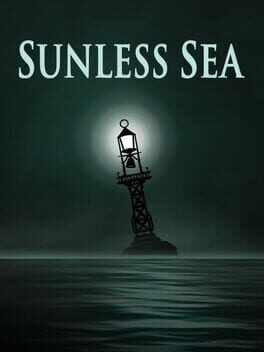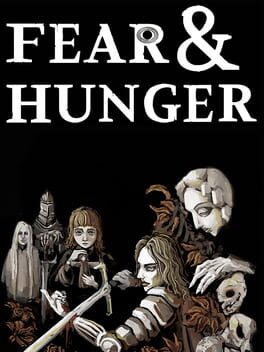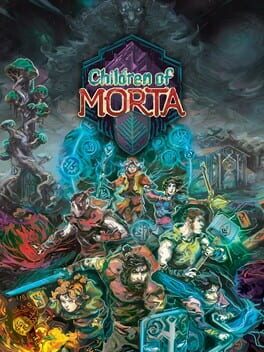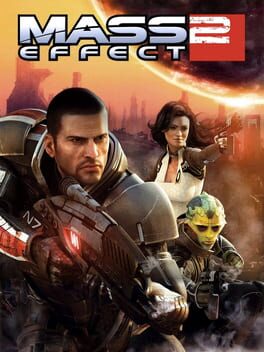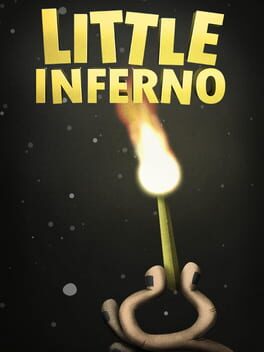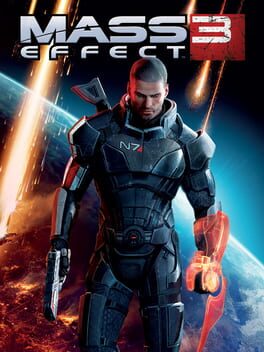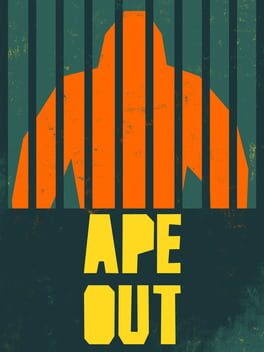Gameovah
2015
Very good atmosphere and worldbuilding, and the narrative is so open you feel you are actually making a journey that's only your own (so many variables, so much freedom, the chance to set your own endings and ambitions). It is also great how it puts the sublime at the very core of the experience (and this is very Lovecraftian): during the first hours, the game is so much mechanically rich and complex that it becomes overwhelming. Survival mechanics and top-down, dark exploration enhance the feeling of being completely lost and vulnerable.
And yet its difficulty is also its biggest flaw, especially because it's combined with one of the worst pacing I've ever seen. The game is so hard you cannot but play it over and over before reaching even just one of your goals. And this usually takes hours, even if you already know where to go and how to survive. If something goes wrong, you are forced to repeat everything, over and over, meaning that most of the hours you spend on the game you basically repeat a standard pattern of early-stage (and painfully boring) actions. And this is nothing but machinic. After some attempts, atmosphere, narrative, Lovecraft, sublimity, disempowerment, exploration... all gets divoured by repetition.
And yet its difficulty is also its biggest flaw, especially because it's combined with one of the worst pacing I've ever seen. The game is so hard you cannot but play it over and over before reaching even just one of your goals. And this usually takes hours, even if you already know where to go and how to survive. If something goes wrong, you are forced to repeat everything, over and over, meaning that most of the hours you spend on the game you basically repeat a standard pattern of early-stage (and painfully boring) actions. And this is nothing but machinic. After some attempts, atmosphere, narrative, Lovecraft, sublimity, disempowerment, exploration... all gets divoured by repetition.
2018
As perhaps one of the hardest games I have ever played, it raises once more doubts about how meaningful difficulty in games could be.
On the one hand, the game openly draws from contemporary mainstream dark fantasy (and especially Miura, even exacerbating its turpitude) in a quite effective way. In their simplicity, character design and implicit storytelling are great, at least assuming you are into body horror and gore. The game hardly introduces something new but it has a raw and brutal imagery - and as a fan of both Silent Hill and Berserk I couldn't but enjoy it.
On the other hand, the game not only uses survival mechanics to improve difficulty but also provides users with some of the most cruel and punitive mechanics I've ever seen. Every minor mistake can put an end to a whole run, and many events that kill you or prevent you from proceeding are random. Many are the choices that lead you to defeat without any chance to avoid it. So it is not only a quite hard survival dungeon crawler but also a trial-and-error rage game. It's more a masochist journey than a challenge, it tests your endurance and self-denial more than your strategy and skill.
This is both its most brilliant feature and most evident issue. The game as a whole depicts a pilgrimage, therefore self-denial and unreasonable defeats reinforce the ultimate meaning of the experience. Sadly, by mixing survival mechanics and trial-and-error it soon becomes machinic, not only excruciating. And the RPG Maker aesthetics is not of help. It is almost impossible to stay immersed - fear and hunger become frustration, enemies become pixels, their movements just patterns, looting just spamming spacebar.
And yet, isn't this the very point of simulating transcendence and martirization? Isn't any spiritual process aimed at prescinding from body, going beyond immanence, and overcoming the "immersion" in the phenomenal world?
On the one hand, the game openly draws from contemporary mainstream dark fantasy (and especially Miura, even exacerbating its turpitude) in a quite effective way. In their simplicity, character design and implicit storytelling are great, at least assuming you are into body horror and gore. The game hardly introduces something new but it has a raw and brutal imagery - and as a fan of both Silent Hill and Berserk I couldn't but enjoy it.
On the other hand, the game not only uses survival mechanics to improve difficulty but also provides users with some of the most cruel and punitive mechanics I've ever seen. Every minor mistake can put an end to a whole run, and many events that kill you or prevent you from proceeding are random. Many are the choices that lead you to defeat without any chance to avoid it. So it is not only a quite hard survival dungeon crawler but also a trial-and-error rage game. It's more a masochist journey than a challenge, it tests your endurance and self-denial more than your strategy and skill.
This is both its most brilliant feature and most evident issue. The game as a whole depicts a pilgrimage, therefore self-denial and unreasonable defeats reinforce the ultimate meaning of the experience. Sadly, by mixing survival mechanics and trial-and-error it soon becomes machinic, not only excruciating. And the RPG Maker aesthetics is not of help. It is almost impossible to stay immersed - fear and hunger become frustration, enemies become pixels, their movements just patterns, looting just spamming spacebar.
And yet, isn't this the very point of simulating transcendence and martirization? Isn't any spiritual process aimed at prescinding from body, going beyond immanence, and overcoming the "immersion" in the phenomenal world?
2019
+ charming aesthetics (mixing high fantasy and sci-fi, surrealism and magitek, spiritualism and cyberpunk, distant planets, trees of life, and pyramids);
+ really cute visuals and pixel art;
+ sweet moments dot the gameplay in a quite powerful way;
- a rather tradional and boring story;
- rather traditional and repetitive game mechanics;
- rather traditional and obtuse sanctification of family - I mean, at least some moments of crisis here and there could work even in such a good-natured storytelling;
- rather traditional and boring progression, entirely built on power fantasy and without, e.g., depictions of weakness or fragility (the fragile and the weak stay home even if they're part of the family).
+ really cute visuals and pixel art;
+ sweet moments dot the gameplay in a quite powerful way;
- a rather tradional and boring story;
- rather traditional and repetitive game mechanics;
- rather traditional and obtuse sanctification of family - I mean, at least some moments of crisis here and there could work even in such a good-natured storytelling;
- rather traditional and boring progression, entirely built on power fantasy and without, e.g., depictions of weakness or fragility (the fragile and the weak stay home even if they're part of the family).
2010
Gameplay and narrative are way better than the first one. Quite sadly, it lacks of its philosophical depth. More moving, cinematic, and focused on characters, and with an epic conclusion. But without the experimental and thought-provoking take on science fiction.
And yet this narrative and emotional build-up is very promising: although I slightly preferred the first one, I am now more curious about the next entry of the trilogy.
And yet this narrative and emotional build-up is very promising: although I slightly preferred the first one, I am now more curious about the next entry of the trilogy.
2012
2012
By far the best entry of the trilogy.
It's still quintessential power fantasy (Shepard is a Übermensch, a hero, a messiah, a transhuman, a martyr, a conqueror, a mass-murderer, and a living weapon at the same time), with repetitive mechanics focused on systematic extermination and shooting (this time at least it depicts war and battlefield...).
And yet how brilliant are the major choices the game asks you (and Shepard) to make... The Tuchanka affair with curing genophage and the quest on Rannoch about making Geths self-conscious (or letting the Quarians exterminate them) are two of the hardest, ethically and morally challenghing, deepest, and emotionally charghed choices I've ever made (and witness making) in a game. It's so dumb as a hyper-empowering imagery as effective as a machine producing philosophically engaging scenarios.
Some sections are also very enjoyable both plot and gameplay wise: the self-reflexive satirical quest against Shepard's clone; the party; the failure on Thessia - all memorable moments, each for different reasons.
The ending is quite messy but moving.
All in all, a good game and a good climax & conclusion for a trilogy.
It's still quintessential power fantasy (Shepard is a Übermensch, a hero, a messiah, a transhuman, a martyr, a conqueror, a mass-murderer, and a living weapon at the same time), with repetitive mechanics focused on systematic extermination and shooting (this time at least it depicts war and battlefield...).
And yet how brilliant are the major choices the game asks you (and Shepard) to make... The Tuchanka affair with curing genophage and the quest on Rannoch about making Geths self-conscious (or letting the Quarians exterminate them) are two of the hardest, ethically and morally challenghing, deepest, and emotionally charghed choices I've ever made (and witness making) in a game. It's so dumb as a hyper-empowering imagery as effective as a machine producing philosophically engaging scenarios.
Some sections are also very enjoyable both plot and gameplay wise: the self-reflexive satirical quest against Shepard's clone; the party; the failure on Thessia - all memorable moments, each for different reasons.
The ending is quite messy but moving.
All in all, a good game and a good climax & conclusion for a trilogy.
2019
